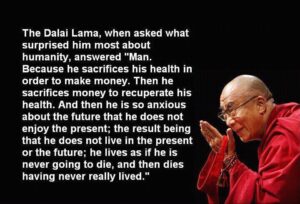To Have A Happy Gut You Have To Understand The Gut Brain Connection
By Maya Cordova
Have you ever felt “butterflies” in your stomach? Do you recall ever having a “gut wrenching” experience or a “gut feeling”? These terms are often used to describe sensations that are paired with emotional responses. They are created by the interaction between the gut and the brain! In the following I will define the gut, describe the gut brain connection, and finally, explore the influences of food, how to manage cravings, and how to make healthy nutritional choices.
The gastrointestinal tract, also known as the gut, begins at the mouth, draws down into the esophagus, stomach, small intestine, large intestine, and ends at the colon. Within the intestinal sheaths of our digestive tract we each have over 100 million neurons that are in constant communication with our brain. This means there are more neurons in our belly than in our in our spinal chord and our peripheral nervous system! These digestive neurons make up the Enteric Nervous System, and are directly affected by the emotions we experience moment by moment. Some common emotions that influence the gut are Exhilaration, Happiness, Sadness, Anger, and Anxiety. The particular experience of Stress and Anxiety impacts the function of the GI tract by causing an inflammatory response and increased acidity. This causes poor nutrient absorption and higher risk for disease. According to a study done by Harvard Medical School, “a person’s stomach or intestinal distress can be the cause or the product of anxiety, stress, or depression.” This is why it is extremely important to become aware of certain stressors in our lives, and learn how to manage them in healthy ways.
Great strategies for relieving stress are: Exercise, Listening to Music, Engaging in Creative Expression (Art, Writing, Dancing, Music etc.), Going for a Walk in Nature, Meditation, Deep Breathing, Yoga, and Counseling.
Nutrition For Gut Health!
Peer-reviewed science is also making clear to us that the foods we choose to put into our body actually cause specific emotional responses. What we eat determines our mood and plays a huge role in determining the health of our brain. According to Dr. David Perlmutter (a leading global speaker and author on nutritional health), eating a high carbohydrate and low fat diet is actually one of the leading causes of brain disease! In order to prevent diseases such as Parkinson’s, Dementia, Alzheimer’s, M.S., Autism, Schizophrenia, ADHD, Coronary Artery Disease, and Diabetes, it is important to eat a diet that is low in carbohydrates (gluten, processed sugar, and alcohol), and high in organic healthy fats and proteins, vegetables, and fermented foods. More than half of our brain is made of fat! Therefore, it is essential to consume healthy fats that will continue to nourish the brain.
Just like the emotional experience of Stress and Anxiety, having a high-carb diet causes increased acidity and inflammation in the body…not to mention making it incredibly challenging to lose weight. The physiological response of inflammation actually changes the bacteria that line the walls of the GI tract. This gut flora, also known as our good “helper” bacteria, aids in the digestion of our food and helps boost the immune system. It is possible to balance the acidity in the gut by eating fermented foods, and incorporating live pro-biotic supplements into your daily dietary routine. This not only allows the body to become more alkaline, making it challenging for microorganisms causing illness and disease to survive, but also soothes the inflammatory response, and replenishes the gut flora that is essential for our overall health.
Foods to avoid: Sugar, artificial sweeteners, gluten, alcohol
Foods to savor: Nutrient dense and organic fiber rich veggies and fermented foods with probiotics such as Kimchi, Tempe, Adzuki Bean Miso, Sauerkraut, Kefir, and Kombucha. Live probiotic supplements, grass fed beef, wild caught fish, free range eggs, olive oil, coconut oil, nuts, seeds, and avocado.
Mind Set For Gut Health.
Retrain Your Brain!! You Can Do It!!
Now that you know what is good for your body, it is time to change those unhealthy eating habits and make your brain and body happy and healthy. This means connecting to your true emotional and nutritional needs, making healthier choices, and managing your cravings. When you begin to feel a strong craving towards food, important questions to ask yourself are:
- Am I stressed out right now?
During a stressful situation, your brain releases a hormone called Cortisol. According to Dina Aronson (a registered dietitian and nutritional author), excess levels of Cortisol can cause weight gain, high blood pressure, high blood glucose levels & suppressed insulin (aka. Diabetes!), inflammation and acidic blood, insomnia, poor memory, constipation, osteoporosis, diminished sex drive, muscle weakness, depression, anxiety, and irritability. High levels of Cortisol can also cause pre-mature aging and suppresses DHEA, aka “youth” hormone. Cortisol prepares the body for the fight-or-flight response, making it very challenging to make rational decisions.
Since glucose becomes high in the blood after the release of Cortisol, but is not absorbed into the cells, the body thinks that the cells need more glucose…more sugar…more carbs!! The body thinks that it is hungry, and the appetite is stimulated.
Comfort foods that are high in sugar actually blunt the release of cortisol. This provides temporary relief in symptoms of stress. Meanwhile, the brain is becoming conditioned into believing that it needs sugar to feel good and that carbs are the solution to unpleasant emotions and experiences! When you reach for that cupcake, your leftover pasta, that bag of chips, or those brownie bites, ask yourself “Am I stressed out?” Then stimulate your own happiness by putting on your favorite CD, exercising, taking a deep breath or meditating, calling a supportive friend, or going for a walk outside. You can even distract your brain by writing someone an email or engage in reading an interesting book. Retrain yourself to partake in activities that make you feel good, but don’t cause the gut and brain to suffer. Then you can begin to address the causes of the present stressors, make necessary changes, and empower yourself to keep living the healthy life you want to live.
- Am I getting enough sleep?
Diminished sleep actually causes an increase in the hormone Ghrelin, an appetite stimulator, and decreases the hormone called Leptin which tells the brain when you are full! Allow at least 7-10 hours of sleep per night. A great strategy to overcoming your cravings is to take a quick 10-minute nap.
- Am I drinking enough water?
Remember it is important to drink half your body weight in ounces of water per day! If you do not consume enough water then the body may confuse the thirst response with the hunger response. When a food craving occurs, it is beneficial to drink at least one full glass of room temperature water before consuming any food. This may diminish the craving completely.
Another technique that will assist with overcoming food cravings is the practice of affirmation and visualization. In the moment of a food craving immediately tell yourself “Stop!” Then visualize yourself healthy, fit, and happy. Feel the sensations of that vision with all of your senses. Repeat a supportive affirmation such as “I am healthy…I eat healthy and I am fit…I love veggies” etc. Eventually, you will be able to manifest your vision and will no longer crave the foods that do not serve your highest good!
All human beings are capable of breaking patterns and cravings, and you can do it too!! May your gut and brain be forever happy and healthy! Happy gut health!
Get more information @


